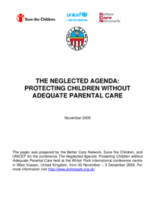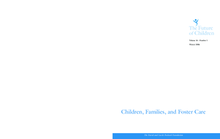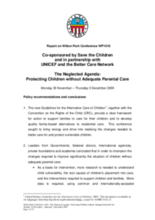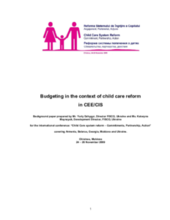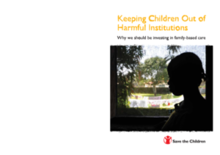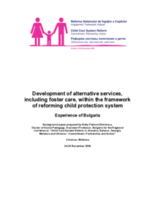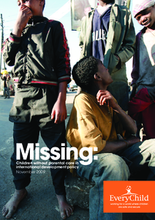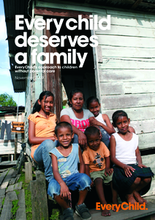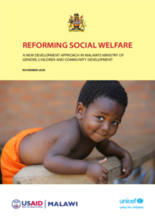Displaying 851 - 860 of 1028
Conference programme, background papers, key policy recommendation from 2009 Wilton Park conference event
Provides global estimates of the number of highly vulnerable children; a summary of United States Government (USG) assistance programs for highly vulnerable children; a summary of progress coordinating the response among USG agencies; key strategic issues and opportunities; priorities for 2009–2010 and beyond; and a summary of the results and achievements of USG assistance
Policy recommendations and conclusions from November’s high level conference focused on gathering data, harnessing political will, strengthening systems, securing funding, and increasing public and political understanding regarding children without adequate parental care
Summarizes main issues in public financial management which have prevented resource reallocation between residential and alternative care services for children.
Examines the latest evidence of the harm institutional care can cause to children. It explores why governments and donors continue to prioritize institutional care, despite the harm it can cause.
The following is a summary of the Bulgarian experience in implementing a comprehensive reform of the care and protection system for children at-risk.
Explores the negative impacts of loss of parental care on children. Advocates for reform for children based on assertion that failure to keep children in families, out of residential institutions and off the streets, will be another barrier to the achievement of the Millennium Development Goals
This document outlines EveryChild’s approach to the growing problem of children without parental care by defining key concepts, analysing the nature and extent of the problem, exploring factors which place children at risk of losing parental care, and examining the impact of a loss of parental care on children’s rights.
Despite its importance to the poorest in society, the social welfare sector in Malawi has not been performing well. Recognising this, the Principal Secretary (PS) in the Ministry of Gender, Children and Community Development (MoGCCD) requested support from United Nations Children’s Fund (UNICEF) and United States Agency for International Development (USAID), who have taken a new approach: supporting the Government of Malawi (GoM) to build a better social welfare system starting at the top, within the Ministry.
Short video illustrating the ways social protection safeguards children and their families – including those affected by AIDS – at every level from communities to entire countries and beyond.

